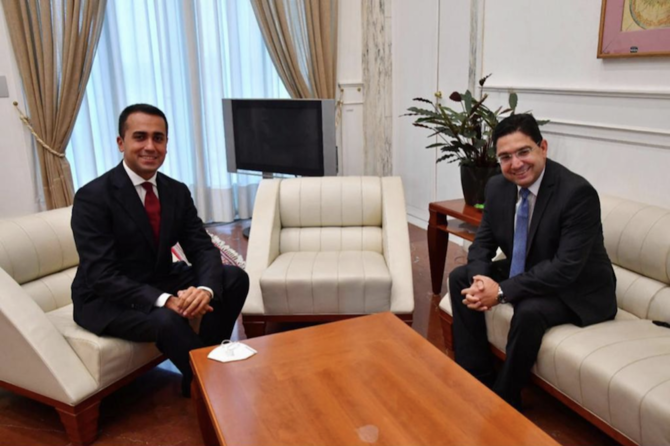ROME: Italian Foreign Minister Luigi Di Maio has praised “the dynamic of openness, progress and modernity” advocated by the King of Morocco Mohammed VI.
During a meeting in Rome with Minister of Foreign Affairs, African Cooperation and Moroccan Expatriates, Nasser Bourita, Di Maio stressed “the need for regional and international parties to work together to help the Libyans find a lasting political settlement.”
In a press conference at the Italian Ministry of Foreign affairs, the Italian foreign minister also praised Morocco for its support of the process of implementation of advanced status in its relations with the EU, as well as the follow-up of the Morocco-EU action plan.
Both foreign ministers agreed to “continue to work for the strengthening of the privileged partnership between Morocco and the EU within the framework of an ambitious strategic vision.”
According to the joint statement issued at the end of the official visit, Luigi Di Maio “welcomed the course set by His Majesty King Mohammed VI, in a dynamic of open progress and modernity, through the design of an adapted and renewed development model and the promotion of advanced regionalization.”
Noting “the depth and quality of the ties of friendship and mutual respect that unite Morocco and Italy, as well as the positive dynamics of bilateral relations,” the two ministers welcomed the prospect of the “multidimensional strategic partnership between Morocco and Italy.”
They agreed to establish appropriate mechanisms for dialogue and cooperation, namely a partnership council at ministerial level and cooperation committees on priority issues.
Both parties confirmed their commitment to deepen economic and commercial collaboration between the two countries, an instrument of growth and friendly relations, and confirmed their intention to organize as soon as possible a “business forum to facilitate contacts and agreements between companies and economic institutions of both countries.”
The forum should take place next year, on the 30th anniversary of the agreement signed in 1991 on friendship and cooperation between Morocco and Italy.
Bourita and Di Maio noted “with mutual appreciation the important contributions of the communities of both countries in terms of economic, cultural and human contribution, and as active actors of Moroccan-Italian cooperation and factor to bring together the two countries.”
After recalling that Italy is the fifth trading partner of Morocco and the fifth provider of tourists, Bourita said that “Morocco’s ambition is to further strengthen our partnership.”
Moroccans are currently the largest non-EU immigrant community in Italy. Moroccans in Italy mainly live in the north: In Lombardy, Piedmont and Emilia Romagna, the regions suffering the highest death tolls due to COVID-19.
It is an economically active community — 20 percent of the Moroccan community is composed of entrepreneurs.
In the previous legislature, Italy’s Parliament included two MPs of Moroccan origin. Many Moroccans are doctors who have been working in Italian hospitals to combat COVID-19.
Libya was one of the main issues discussed at the bilateral meeting. Both ministers, Italian diplomatic sources told Arab News, stressed the “need for regional and international parties to work together to help the Libyans find a lasting political settlement.”
Italy and Tunisia welcomed the international initiatives under the UN process, particularly the meetings held in Bouznika, Morocco, in September and October 2020.
“They testify to the constructive role that Morocco is playing for the resolution of this crisis,” the same source said.
“On Libya in particular, we have seen a real convergence of views and positions,” Bourita said. “Morocco greatly appreciates the constant, constructive and positive attitude of Italy on the Libyan issue, as Italy has always worked to preserve the stability and unity of Libya, which is a fundamental objective for us,” he said.














